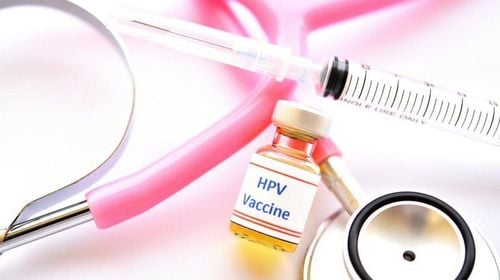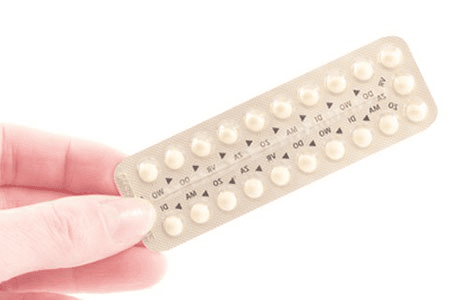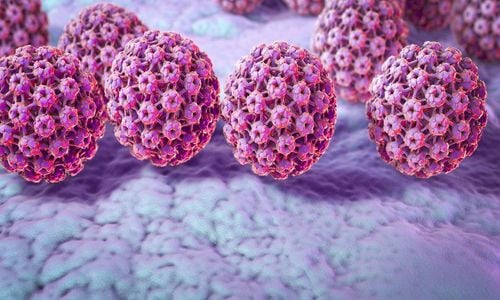This is an automatically translated article.
The article was written by Specialist Doctor II Phung Thi Phuong Chi - Oncologist - Oncology Center, Vinmec Central Park International General Hospital. The doctor has 20 years of experience in the field of oncology.Vinmec provides Cervarix vaccine that prevents the 4 most common high-risk HPV types that cause cervical cancer. Even with the cervical cancer vaccination, cervical cancer screening should still be done periodically in women turning 25.
1. Laparoscopic cervical cancer surgery
Hysterectomy can be performed through laparotomy or through laparoscopy or vaginally o. The most advanced technique is Robotic Laparoscopic Surgery.Laparoscopic surgery in gynecological pathology was born 50 years ago. Up to now, laparoscopic cervical cancer surgery has been performed in many countries with advanced medical background in the world and is also being performed at Vinmec Central Park International Hospital.
Laparoscopic surgery is surgery through small openings in the abdominal wall. The doctor uses a small tube with a video camera on the end of the tube to penetrate the abdominal wall through a small hole for the surgeon to see inside and perform surgery. Laparoscopic surgery can be performed with the help of a robotic arm, which is controlled by the surgeon via a computer system.
Laparoscopic surgery has the following advantages:
The surgery is less painful, less blood loss when performed Laparoscopic surgery helps to shorten the hospital stay (usually 3-5 days), even 1-2 days, and complete recovery is short (2-3 weeks) while laparotomy requires a longer hospital stay (5-7 days) and a longer complete recovery time (4-6 weeks) Injury to cancer very early, laparoscopic surgery shows that it still ensures the same level of cancer safety as open surgery. Therefore, there are selective indications in some cases of very early cancer, small cervical lesions, and depending on the benefit and benefit considerations after the patient's discussion with the doctor.
2. Physical and psychological changes after cervical cancer surgery
After surgery for cervical cancer, the patient may encounter 1 or more of the following problems:Surgical scars affect the patient's aesthetics and psychology. doesn't really change sexual compatibility. Although the vagina is shortened, the sensory areas around the clitoris and vagina are still intact. Cervical cancer can cause pain and bleeding during intercourse, and a hysterectomy improves sex life by eliminating these problems. To date, there are no studies showing that a hysterectomy affects the ability to achieve sexual satisfaction. Only surgical treatment combined with radiation therapy can affect sexual intercourse.
Vagina: Unlike many people mistakenly believe, after a hysterectomy, the vagina will not open to the pelvis but is sewn closed at the top. A short vagina can feel difficult, but a couple can adjust to this change. Ovaries: Can be removed or kept. If a woman is younger than 40, her doctor will usually try to save part or one side of her ovaries during a hysterectomy. Even if only one ovary is left, it can compensate and maintain enough female hormone levels. If a woman is 40-50 years old, the doctor will consider removing both ovaries to prevent ovarian cancer, this should be discussed with the patient. If a woman is over 50 years old, both ovaries should be removed during surgery for cervical cancer because most of the ovaries have stopped working by this time. Bladder: Radical hysterectomy can affect the bladder's urinary function during the recovery of nerve tissue around the cervix. With new surgical techniques and nerve preservation, these problems have been greatly reduced. To date, some surgeons still circulate urine for a few days to relieve bladder symptoms. Physiological Changes: Changes in sexual desire and activity vary widely from person to person. Some women may have no change at all, some increase their libido due to reduced discomfort and pain due to cancer before surgery, especially psychological comfort in women who have not yet gone through menopause due to cancer. No more fear of unwanted pregnancy. Psychological changes: Changes in self-perception can also lead to changes in sexual desire and satisfaction. Some women feel that they have lost their femininity, others feel abnormal when they no longer have periods every month and fear that they will change their feminine shape compared to before hysterectomy.
3. Care after cervical cancer surgery to avoid psychological trauma and physiological changes in the body

Phụ nữ sau khi phẫu thuật cần được nghỉ ngơi để phục hồi sức khỏe và trở lại cuộc sống
Depression: Common symptoms are feelings of sadness and disappointment about prolonged life, loss of interest in life, loss of appetite, excessive weight loss or gain, sleep disturbance, sexual dysfunction, feelings of lack of energy, thoughts of death or suicide. When experiencing these problems, patients need to talk directly with their doctor. Menopause due to surgery and hormone replacement therapy When not yet menopause but have to remove the uterus and 2 ovaries, the patient will have problems menopause due to surgery. This does not change in a natural way but happens suddenly and can cause a lot of anxiety.
Doctors recommend using hormone replacement (estrogen plus progesterone) to relieve discomforts such as hot flashes and vaginal dryness. Hormonal replacement therapy can be taken by mouth, patch, spray, gel, or implant.
Female hormone can be supplemented by eating a diet rich in phytoestrogens and calcium, especially by exercising regularly, learning how to manage stress, and using herbs.
Sex after hysterectomy Sexual activity can return in 6-8 weeks. Recovery time varies from person to person, so consult your doctor at your follow-up visit. When women have not had menopause and have had their ovaries removed, women will experience a thin and dry vagina that causes discomfort during intercourse.
This discomfort can be alleviated by using a lubricating gel such as K-Y Jelly, vaginal estrogen cream or either vaginal endometriosis or oral hormone replacement medication. There are also some aids in case the vagina is too short to make sex better such as: lubricating gel, vaginal dilator or female cooperation.
Some women feel like they've lost their femininity after a hysterectomy, feeling "empty," or not really a woman. Therefore, psychological issues play a very important role. If you have a lot of difficulties, you need to consult with psychologists, counselors and therapists.
Please dial HOTLINE for more information or register for an appointment HERE. Download MyVinmec app to make appointments faster and to manage your bookings easily.
The article references the American Cancer Society's source, Facs.org.












